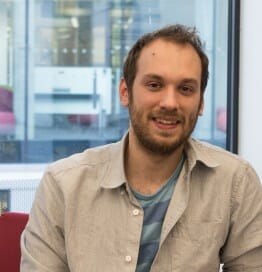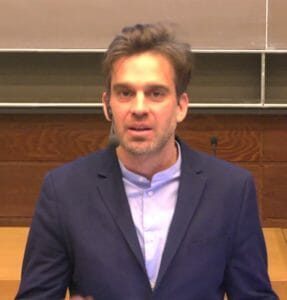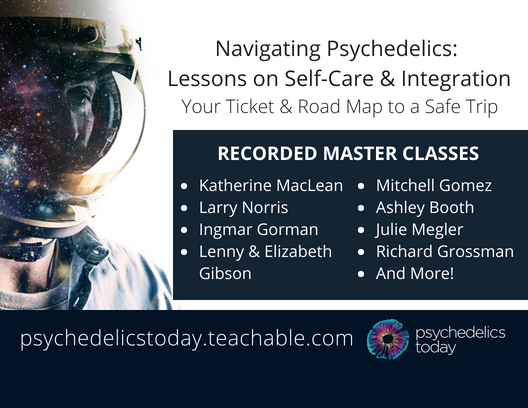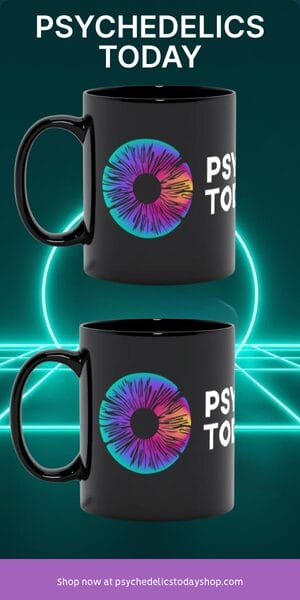
In this episode, hosts Kyle and Joe interview Balázs Szigeti, PhD and David Erritzoe, PhD to discuss the self-blinded microdosing study in collaboration with the Imperial College London.
In this episode, they explore the self-blinding study and it’s pros and limitations, with the aim to collect data on microdosing and its possible benefits.
**Update as of 1/22/2018 – The plant psychedelic study extension was approved, together with the extension that allows for volumetric dosing.
3 Key Points:
- Microdosing (LSD) has the least amount of research so far among research on drugs like Psilocybin, MDMA and Ketamine.
- This microdosing study includes a procedure on how self-experimenters can implement placebo control. This will help determine whether microdosers feel benefits due to the placebo effect or because of the pharmacological action of the microdose.
- Just because microdosing may have a placebo effect (the way a user feels while taking it) it may actually have benefits that one cannot necessarily ‘feel’ (users may become more creative, have better problem-solving skills, etc).
Support the show
- Patreon
- Leave us a review on iTunes
- Share us with your friends – favorite podcast, etc
- Join our Facebook group – Psychedelics Today group – Find the others and create community.
Navigating Psychedelics
Show Notes
About Balázs
- Balazs attended his undergrad in the UK at Imperial College and studied Theoretical Physics
- He moved to Scotland to get his Ph.D. in Computational Neuroscience
- He became interested in psychedelics via the Global Drug Survey
- He was doing MDMA research and then the microdosing project came to him
About David
- He is a medical doctor and works in clinical psychology doing research
- He does brain imaging and his background has been in addiction, depression and schizophrenia
- He did his postdoc at Imperial and worked with Robert Carhart Harris
- He worked in a clinical trial working with people of treatment-resistant depression
- He is currently working on an online survey for microdosing
Psychedelic Medicine
- MDMA for PTSD is the most advanced in terms of available scientific evidence for psychedelic medicine
- There is already a big gap in psilocybin vs MDMA for treatment
- There isn’t much research on microdosing yet
- In order to do research on microdosing, you’d have to bring in a ‘patient’ and have them in the lab for many hours at a time, very frequently, and it’s not practical
The Microdosing Study
- In this microdosing study, they are testing cognitive function
- The user will have to fill out a questionnaire throughout the duration of the microdose
- There were a lot of things, very political for the downfall of psychedelic science
- When the double-blind method was introduced for science, it used methods that would have compromised the ‘setting’ of taking psychedelics
- There is a manual that the users have to follow for the setup process
- Its a semi-randomized process where they take the microdose over 4 weeks and it may be either the psychedelic or a placebo
- It works on a method of a dose hidden in a capsule assigned to a QR code, where the user doesn’t know what they take until the end of the study
- This is a study inviting people that plan to microdose a blotter based psychedelic or plant-based psychedelics.
- Its a hands-off study of observation, based on a users own plan on taking the substance
Summary of the Study
The Imperial-Beckley self-blinding microdose study is a new global study on psychedelics microdosing. The study uses a unique ‘self-blinding’ methodology where participants implement their own placebo control.
In the study, voluntary participants microdose on their own initiative, using their own substance, without the study team’s supervision. However, the study team provides a manual that explains step by step how self-experimenters can set up their own placebo control. The placebo control is implemented by placing both microdoses and empty capsules into sealed envelopes, which are then labelled with QR codes and distributed according to a schedule. Participants won’t know whether their capsules contain a microdose or an empty placebo until the end of the study.
The study is run entirely on the internet, therefore microdosers can participate from anywhere in the world, recruitment is now open.
This ‘self-blinding’ design allows the team to investigate whether the purported benefits of microdosing are due to the placebo effect, or the pharmacological action of the psychedelic, which is a critical scientific questions regarding microdosing.
Limitations of the Study
- Its half-way between a clinical study and an observational study
- They aren’t sending the users the LSD, they are just providing the platform for the users to share their experience on
- In this trial, the flaw is that the research team doesn’t know the dose size of the blotter the user takes, it could start as a 100mg, more, less. Its a variable that cannot be controlled
- The fix would be to have the LSD sent to the lab, tested for dose size, and then sent back to the user (anonymously), but since it’s illegal it cannot be done
- It’s also hard to determine even distribution of a blotter into microdose size
- They don’t know if the user is cutting the blotter paper like a pie or in squares
- Also, because the drug is being bought on the black market, they wont know if there are adulterants in the drug unless the user tests the drug themselves
- David and Balázs also say that based on current findings, most LSD tested is pure LSD, where a drug like MDMA is more common to contain an adulterant
- They do have plans to extend the study to include plant based psychedelics and volumetric dosing
What is a Psychedelic Microdose?
- Psychedelic microdosing is not the same as Pharmacological microdosing
- A microdose in pharmacological context is 1/100th of a dose, where a psychedelic microdose is more like 1/10th of a dose
Is Microdosing Worth it?
- People like David Nichols and Ben Sessa think microdosing is pointless
- It could be that microdosing is a glorified placebo effect
- Most people who are microdosing have had previous experience with psychedelics
- People are doing it because they believe there is a benefit that comes from it
- The placebo control is the most important component of this self-blinded method
- People say that microdosing stimulates their creativity, but creativity is hard to measure
- One thing they could measure is personality through a personality assessment
- One thing that has been studied is an increase in the ‘Openness’ personality trait after psychedelic use
- The flaw is that a personality test is a person answering questions about themselves
Current Findings
- The benefit of this study is it doesn’t take people out of their natural, personal setting
- Based on the feedback already received, the users are getting their guess right only half of the time, on whether it is the microdose or the placebo
- Just because microdosing may have a placebo effect (the way they feel while taking it) it may actually have benefits (users may be more creative, have better problem-solving skills, etc).
- Homeopathy is widely believed to be a placebo effect in the scientific community, but the homeopathy is continuing to grow
Setting Up the Study
Links
About Balázs Szigeti, PhD

Dr. Balazs Szigeti has studied theoretical physics at Imperial College, but turned towards neuroscience for his PhD studies at the University of Edinburgh. His main work is about the behavioural neuroscience of invertebrates, but he has a diverse scientific portfolio that includes computational neuroscience and driving forward the OpenWorm open science initiative. Balazs is also the editor of the Dose of Science blog that is published in collaboration with the Drugreporter website. Dose of Science discusses and critically assesses scientific studies about recreational drugs. Recently Balazs has started a collaboration with the Global Drug Survey to quantitatively compare the dose of recreational users of various drugs with the scientific literature.
About David Erritzoe, PhD

Dr. David Erritzoe is qualified as a medical doctor from Copenhagen University Medical School and currently holds an Academic Clinical Lectureship in Psychiatry at Imperial College London. Alongside his clinical training in medicine/psychiatry, David has been involved in psychopharmacological research, using brain-imaging techniques such as PET and MRI. He has conducted post-doc imaging research in the neurobiology of addictions and major depression. Together with Prof Nutt and Dr Carhart-Harris he is also investigating the neurobiology and therapeutic potential of MDMA and classic psychedelics.



